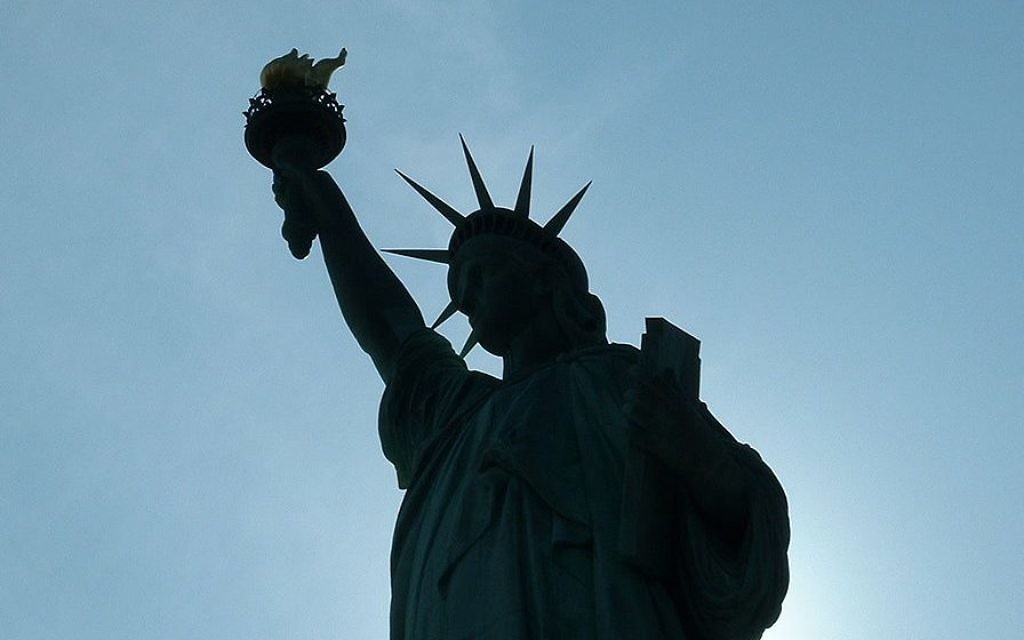When America Scorned Jewish Immigrants
President Trump's profane mocking of certain countries echoes despicable moments in U.S. history.
I have shelved, yet again, a perfectly serviceable column — about ideological divides in the Jewish community — because something else is stuck in my craw.
In my computer, its replacement is titled “Shithole.”
No asterisks to replace the letters, please.
Get The AJT Newsletter by email and never miss our top stories Free Sign Up
In a meeting with members of Congress working on immigration reform, the president of the United States is said to have asked, “Why are we having all these people from shithole countries come here?”
The immigrants being discussed were from the African continent, as well as Haiti and El Salvador.
President Donald Trump also is reported to have wondered aloud why the United States couldn’t admit more immigrants from Norway and, because of their potential to aid the U.S. economy, nations in Asia.
His timing being what it is, Trump made these comments one day before the seventh anniversary of the earthquake that devastated Haiti and one day before signing a proclamation to mark Martin Luther King Day.
All of this prompted me to look back to the last century, when many of our Jewish forebears (90 percent of American Jews are Ashkenazi, primarily of German or Eastern European descent) came to the United States from what xenophobic Americans then considered to be the “shithole” countries.
They didn’t look like “regular” Americans.
They didn’t sound like “regular” Americans.
They didn’t pray like “regular” Americans.
Many came with nothing more than the clothes on their back, personal possessions in their satchels, the hope that the United States would offer sanctuary from religious persecution, and a dream that this country would offer their children and their children’s children opportunities not possible in the Old Country.
Today, most of us, their grandchildren and great-grandchildren, live comfortably.
We live in nice homes.
We have food on our tables.
We are well educated.
We pray where, when and how we like.
The barriers that hindered previous generations of American Jews in the workplace, in schools and in public accommodations are pretty much a thing of the past.
When Congress passed the Immigration Act of 1924, post-World War I nativist sentiment was rampant and often directed at Catholic and Jewish immigrants. That law most notably restricted the immigration from Southern and Eastern Europe, severely limited immigration of Africans and Arabs, and excluded Asians.
“In all of its parts, the most basic purpose of the 1924 Immigration Act was to preserve the ideal of U.S. homogeneity,” according to a State Department history page.
“America must remain American,” President Calvin Coolidge said in signing the law.
It was a slap in the face of the Statue of Liberty, that lady lifting a lamp of freedom in New York Harbor, which, ironically, Coolidge dedicated in the same year.
It was a repudiation of Emma Lazarus’ poem “The New Colossus,” which was carved into its base in 1903.
Not like the brazen giant of Greek fame,
With conquering limbs astride from land to land;
Here at our sea-washed, sunset gates shall stand
A mighty woman with a torch, whose flame
Is the imprisoned lightning, and her name
Mother of Exiles. From her beacon-hand
Glows world-wide welcome; her mild eyes command
The air-bridged harbor that twin cities frame.
“Keep, ancient lands, your storied pomp!” cries she
With silent lips. “Give me your tired, your poor,
Your huddled masses yearning to breathe free,
The wretched refuse of your teeming shore.
Send these, the homeless, tempest-tost to me,
I lift my lamp beside the golden door!”
Not until the Immigration and Nationality Act of 1965 were national-origin quotas scrapped and greater consideration given to immigrants’ personal connections to Americans and, yes, the occupational skill sets they might possess. In signing the law, President Lyndon Johnson said that it “corrects a cruel and enduring wrong.”
If you question whether Trump’s remarks (not the first time he has denigrated people who seemingly do not fit his image of an American) are indefensible, inexcusable and patently un-American …
Think back a century and check your family tree.





comments